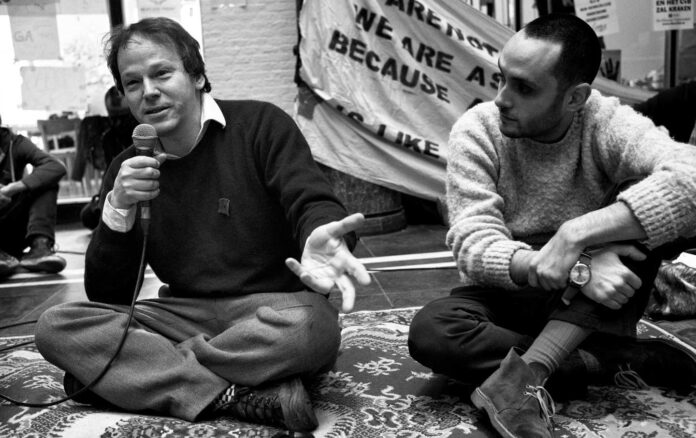On 2 September 2020, the world-famous anthropologist David Graeber passed away. Graeber will be remembered for his incredible and original scholarship and his role in various political movements. He was known for coining the expression, “We are the 99%,” a political slogan against the economic inequality in the USA.
I write this article with a heavy heart, as Graeber was someone who left the world with a large hole to be filled. He was a rare academic who was politically active, giving inspiration to many of us.
Debt: The first 5000 years, is a book that brought his scholarship and politics together. Graeber decided to write this book as a result of conversations he had as an anti-Globalization activist. (He disliked that name, anti-Globalization because the so-called Globalization leads to isolation and xenophobia, and stricter controls on immigration. This so-called Globalization was just for multi-national corporations to get profit. )
The anti-Globalization movement brought attention to how first world countries, and international organizations like IMF and the World Bank, kept poorer countries in debt and forced them to adopt neo-liberal policies.
Debt is a key system of control. When taking part in the struggle, Graeber said that many people were confused by the demands of the protesters. If poor countries are in debt, shouldn’t they work to pay off their debts?
It is clear that debt is used to push poor countries into deeper levels of poverty, and leave them at the mercy of richer countries. Even within countries, debt is a tool by the elite class to oppress the broader population. As oppressive as debt it, it appeals to our common sense. Graeber’s book was intended to separate the myths and the facts regarding debt and look at the history of debt.
Graeber’s research explains where the idea of debt comes from. In ancient cultures, debt was a positive thing. People would help each other in different situations, and when receiving help, people would be indebted to them.
As power systems evolved, debt would become entangled with those systems of power, be them patriarchy, conquest, caste, or money. Early power systems emphasized using peoples’ moral values against them, which is how religions originally evolved. Debt became a tool in preserving systems of power. Graeber showed how rules regarding debt forgiveness, intergenerational debt, and dowry systems were developed with debt, evolved in different parts of the world to become the systems of state, market, patriarchy and community.
While debt is a tool of oppression, it works because it is based in a very basic moral impulse. That is to return a favour that someone grants you. Not all debts are supposed to be paid back, Graeber notes. For example, children may feel indebted to their parents. People might feel indebted to their friends, but to pay back those debts almost feels cruel, as if to erase the relationship. Graeber shows how, in different cultures, to pay back a debt, is almost like breaking a relationship.
Debt is becoming an important political issue. In India, Household Debt has risen from 9% of the GDP to 13% of the GDP since 2014. This is still low by global standards but doesn’t take into consideration informal credit systems that are large parts of the Indian economy and have been used to control people. In recent times, with the rise of online credit systems, gradually the Indian moneylender, who gives quick credit to those in need, is becoming an app.
Graeber’s work reminds us that debt and morality are connected, as debt is a natural relationship that arises when people are in need. The impulse to help others without asking for anything in return is strong and can help us form a more just society. When we are given aid, either in a formal process, like through a bank, or an informal process, like with a friend, we feel obligated to return the favour. This forms a basic principle that Graber calls Everyday communism.
Everyday communism is the impulse to give to every one according to their needs and to help to the best of everyone’s ability. We see it all around us. As Graeber points out, even in the most corporate of businesses, workers have to cooperate to get a job done. If they were constantly negotiating while working, no work would ever get done.
Outside of the workplace, we also try to help other people, when the cost of helping people seems so low that one can forgive the debt without much thought, or when the need is so high that one feels cruel for not helping. Everyday communism is often a good impulse that lies beneath the surface. With the proper political institutions and social structure, everyday communism can become a more powerful force in the economy. In everyday communism, forgiving a debt is a norm, and promotes social harmony.
The holding of a debt, in many religions, has been associated with evil. As Graeber points out, the words for sin and debt are often the same, and many religions have stories about punishments meted out to people who hold on to debts in a cruel manner, and to people who have not paid off their debts. Finishing a debt, either by payment or by forgiveness, as always been an important part of morality.
Graeber saw this work as being an important part of political action. Whether it is the debt between rich and poor countries or the debt between rich and poor people, we musty remember that debt is an ethical issue and needs a moral approach that is kind and just. He felt that with the 2008 financial crisis, the people of America were beginning to understand that. Hopefully, we will too.



























